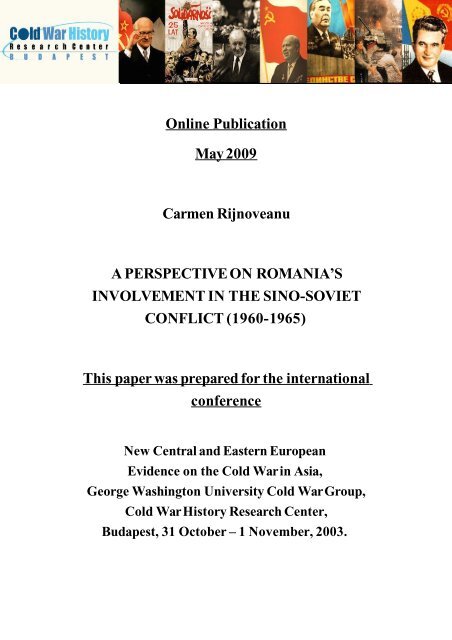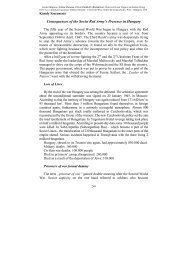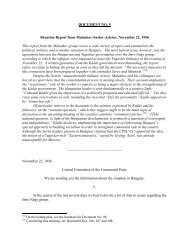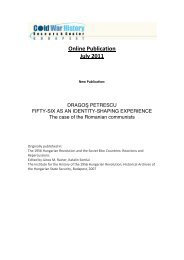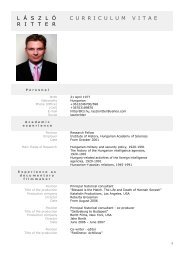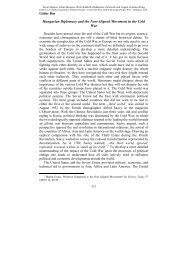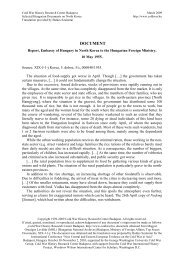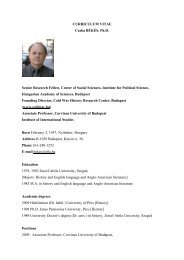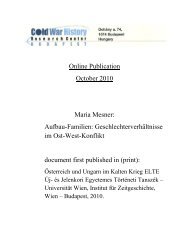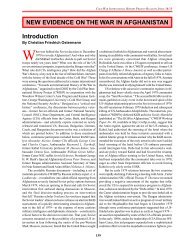Online Publication May 2009 Carmen Rijnoveanu A PERSPECTIVE ...
Online Publication May 2009 Carmen Rijnoveanu A PERSPECTIVE ...
Online Publication May 2009 Carmen Rijnoveanu A PERSPECTIVE ...
Create successful ePaper yourself
Turn your PDF publications into a flip-book with our unique Google optimized e-Paper software.
<strong>Online</strong> <strong>Publication</strong><strong>May</strong> <strong>2009</strong><strong>Carmen</strong> <strong>Rijnoveanu</strong>A <strong>PERSPECTIVE</strong> ON ROMANIA’SINVOLVEMENT IN THE SINO-SOVIETCONFLICT (1960-1965)This paper was prepared for the internationalconferenceNew Central and Eastern EuropeanEvidence on the Cold War in Asia,George Washington University Cold War Group,Cold War History Research Center,Budapest, 31 October – 1 November, 2003.
<strong>Carmen</strong> <strong>Rijnoveanu</strong>A <strong>PERSPECTIVE</strong> ON ROMANIA’S INVOLVEMENT INTHE SINO-SOVIET CONFLICT (1960–1965)On February 14, 1964, as the Sino-Soviet conflict deepened, the leaders of theRomanian Workers Party (RWP) forwarded simultaneously two letters, one to theCentral Committee of the Soviet Communist Party and the other to the ChineseCommunist Party. On this occasion, some elements had been emphasized,primarily the necessity for this polemic to cease, as well as the restoring of thecommunist movement’s unity. In addition, there was the avoidance of publishing“compromising” documents, which could have affected, irreversably, the effortsfor settling various divergences. 1“The Politburo of the CC of the RWP, as was also specified in these letters,considers that it is not too late for more efforts to be made in finding theappropriate ways and means to prevent this split”. 2Also, in the letter forwarded to the Central Committee of the Chinese CommunistParty, Romanian leaders expressed their desire to have a meeting with theirChinese counterparts in order “to discuss some problems of interest regardingthe international communist movement”. 3Practically speaking, Romania claimed the role of an impartial mediator,motivated by the “desire” to contribute to the restoration of the communist camp’sunity. This could have provided for itself a distinct status at the communist blocklevel, on the condition that the status be accepted and recognized by both partiesinvolved in the conflict.In answering these letters, both the Soviet and Chinese parties forwarded to theCentral Committee of the Romanian Workers Party a reply letter pointing out that,due to Bucharest’s approach, both parties are willing not to publish “polemicmaterials” and to increase their efforts in order to find the appropriate ways andmeans for “comradely” discussion. At the same time, the visit of a RWP’sdelegation in China had been accepted. This visit would begin on 1 March 1964.1 The letters forwarded to the Central Committee of the Soviet Communist Party and the Chinese Communist Party, 18 February1964, Bucharest, Central Historical National Archives (C.H.N.A.), Fond CC of the RCP,Foreign Relations Section, File 3A/ 1964, pp. 248-249.2 Ibidem, pp.250-251.3 Ibidem, p.251.1
Analyzing the content of these letters, as well as other significant documents onthis issue, some questions can be raised:• Was the Bucharest leadership legitimately worried about the deepeningof Sino-Soviet contradictions?• Did RWP have a proven power of influence or mediate this conflict?• Did the worsening of this conflict provide some advantages or otheropportunities for the leadership in Bucharest, and was it interested inrelieving itself from Moscow’s absolute control, in turn promoting its ownpolitical orientation at the communist block level?• Did this conflict influence in any way Bucharest’s policy?• Did RWP actually desire that this polemic and conflict come to an end? Itis no doubt that the Sino-Soviet ideological and power rift had an influencialimpact on the communist world, deeply affecting the “monolithic feature” ofthe system placed under the strict hegemony ofMoscow.The first symptoms of the Sino-Soviet rift occurred during the mid-50’s andbecame acute in the early 60’s. The main reasons for this dispute, whichpractically divided the entire international communist movement, are complex andcan not be separated by a clear reality; the competition for supremacy at thecommunist world level.The policy of detente and peaceful coexistence, initiated and promoted byKhruschev after the 20th Congress of the Soviet Communist Party, had beenperceived by his Chinese counterpart as a deviation from the normal politicalcourse which the communist movement, as a whole, was required to be basedupon. CCP used this situation as a pretext for promoting its own politicalprinciples and views regarding the communist movement and its development.This difference in views represented one of the irreconcilable issues throughoutthe dispute between the great communist powers.It was obvious that the promoting of such diverse ideologies did not represent thereal reason of discord, or rather not the single reason. Communist China, strivingto gain more power, had been interested in strengthening its position at theinternational level, as the Soviet Union had perceived correctly. The access tonuclear weapons provided the higher reputation necessary in achieving this goal.The refractory Soviet attitude towards Chinese policy of nuclear weapons2
increased the mutual suspiciousness and, at the same time, encouraged China toacquire its own atomic weapons. From the Soviet point of view, China’s claim ofplaying a larger role at the international level, and its policy of armament andprocurement of modern military techniques, could have become a threat to Sovietinterests. This seemed a reality which had to be prevented. The adoption ofsuch irreconcilable positions regarding some of the international problems, aswell as the competition for supremacy in the communist world, could havepotentially split the communist block and provoked a major crisis in the relationsbetween the great communist powers of the time.For RWP, the nature and ideological significance of the conflict, the oppositionbetween Beijing and Moscow, did not represent the main subject of interest orconcern. What was really important related to the fact that the deepening of thisrift between the two countries could have been used as an advantage for thecommunist leadership in Bucharest, which was interested in promoting a distinctand autonomous political course, despite the restrictions present under the strictcontrol of Moscow.Beginning with 1960, Romania, without questioning her allegiance to the socialistcamp, promoted, sometimes with a great deal of risk, a policy of “detachment”.The country would sometimes even promote autonomy, desiring someindependence from the constraints imposed by Moscow to the satellite states.The year 1960 had a double significance at both the internal and external level.From the internal point of view, some achievements had been done - theabolishment of the SOVROMS 4 , the retreat of the Soviet counselors, and thewithdrawal of the Soviet troops. These achievements provided the basicconditions for the beginning of an internal process of detachment from USSR,without changing the very nature of the regime itself. From the external point ofview, the Sino-Soviet ideological and power rift caused a certain weakening of theSoviet influence and political authority. This reality provided Romanian leaderswith more maneuverability, allowing them to promote their own political actionsbased upon the national values and interests of the country.The “detachment” from Moscow was done simultaneously at the economic,internal and external levels.4 SOVROMs were mixed Romanian-Soviet companies created in compliance with the Accord for EconomicCollaboration between Soviet Union and Romania from <strong>May</strong> 8th 1945. Their main justification was to provideto Soviet Union the established war compensations.They were based on the principle of half-shares, each of thecontracting parties having 50% percent of the shares. In fact, all these companies were entirely under theSoviets control becoming the expression of the Romania’s economic exploitation. SOVROMs included almostall Romanian economical branches, including the financial and banking systems. The last SOVROMcompany- SOVROMCUART- has been abolished in 1956.3
Within the Council of Mutual Economic Aid (Comecon), Romania adopted arelentless stand: it refused to accept any Soviet pressure aimed at encouragingeconomic integration of the socialist countries. It also refused the development ofsupra-national economic structures 5 (the EEC had been, in a way, the startingpoint for building the Comecon) intending to create the economic subordination ofthe satellites.5 Romania adopted this same stance with regard to theimplementation of the principle of the “labor’s international division inside of thesocialist camp”, which would have provided to Romania, according to the Sovietplans, a role of supplying agricultural products and raw materials to the moredeveloped socialistcountries. 6 Therefore, the Bucharest regime initiated a high-level industrializationprocess simultaneously with the increase of economic cooperation withYugoslavia and China. The measures taken by Dej’s régime provoked an openconflict with Moscow within Comecon.The same attitude was adopted by Romania regarding the Warsaw Pact as well.Despite the pressures against it, Romania firmly rejected any kind of politicalmilitary integration through the establishment of supranational structures withinthe alliance. 7The Soviet pressures for economic and political-military integration had beenstrengthened due to the deepening of the conflict with communist China. Thecontrol over the satellites had to be emphasized in order to avoid a possible riftinside of the political-military bloc under the Soviet domination. Dej proveddiplomatic ability in dealing with these two phenomena simultaneously; the“detachment” from Moscow (including the rejections of the Soviet lines) and theinvolvement, preserving its neutrality, in the Sino-Soviet dispute.5 The plan for setting up of an economic planning supra-national structure has been delivered by Khruschevduring the Meeting of Comecon’ countries which took place in Moscow on August, 3-5, 1961.6 During the Plenum session of the reprezentatives of the Communist and Workers’ Parties from socialistcountries and of the Political Consultative Committee of the member-states of the Warsaw Treaty, the principleof specialization was firmly rejected by the Romanian delegation : “we can not transform ourselves in asupplier of raw materials for the other countries’ well-being.” Shorthand of the Meeting of the Politburo of theCentral Committee of the Romanian Workers’ Party (CC of RWP), from February 8, 1960, Central HistoricalNational Archives, (C.H.N..A.) Fund CC of the RCP, Chancellery Section, File no. 9/ 1960, p. 18.7 Dej did not accept the setting up of a new standing structure of the deputy foreign ministers within WarsawTreaty as well as the establishing of the General Staff of the United Armed Forces. Memoranda of Discussionsat the Meeting of the First Secretaries of the Central Committees of the Communist and Workers’ Parties andthe Presidents of the Council of Ministers of the Warsaw Pact countries held at the residence of the CentralCommittee of the Polish United Working Party, Bucharest, January 20, 1965, C.H.N.A., Fund CC al RCP,Foreign Relations Section, File no. 15/ 1965, p.124-127.4
The perception of the motivations that determined Romania to assume the role ofmediator should be correctly assessed. The Romanian leaders were far fromhaving the necessary power to play a significant role in settling the Sino-Sovietdivergences. Yet, as these divergences worsened, they created the necessarycontext and rationale for expressing some ideas and directions of actions.Such actions would never have been accepted by Moscow’s leaders underdifferent circumstances. 8The Romanian leaders used as the main argument for their involvement in thisdispute, their “great” concern regarding the possible prejudices that could havebeen provoked within the unity of the communist movement through theworsening of the conflict, which could have had serious long term consequences.This idea had been emphasized in the letter of 18 February 1964 forwarded byBucharest to the Central Committee of the Albanian Communist Party> “Ourparty, it was specified in the letter, as well as other brotherly parties, is deeplyconcerned due to these grave divergences affecting the unity of the internationalcommunist movement”. 9The position to be adopted had been clearly expressed by one of Romania’scommunist leaders, Alexandru Drghici, during the meeting of the CentralCommittee of the Romanian Workers Party, which took place on 18 July 1963.“We disapprove both Chinese and Soviet approaches aimed at rejecting someproposals. This must be our position. ” 10In doing so, Romania obviously adopted a position contrary to that adopted byMoscow and its satellites. At the beginning, the communist leadership inBucharest expressed a critical attitude towards China’s policy. This could beseen in the declaration made by the prime-minister Ion Gheorghe Maurer, duringthe official reception of the president of the Indian Communist Party in Romania;“Of course, such positions (as the Chinese ones) produce difficulties, take theunity we aim to realize out from the international communist movement”. 118 Alexandru Osca, Soviet-Chinese Polemic, Just a Pretext for Romania in On Both Sides of the IronCurtain, Military Publishing House, Bucharest, 2001, pp.98- 105.9 The Letter of the CC of the RWP forwarded to the CC of the Albanian Communist Party regarding the Sino-Soviet divergences and the Romania’s stand towards them, February 18, 1964, C.H.N.A., Fond CC of RCP,Chancellery Section, File 3A/ 1964, p. 248.10 Shorthand of the Politburo of the CC of the RCP regarding the aprouving of the delegation participating inthe Consultative Political committee of the Wrasaw Treaty as well as the Mongolia’s request in order to beaccepted as a member of the Organization, July 18, 1963, C.H.N.A., Fond CC of the RCP, ChancellerySection, File 39/ 1963, p. 128.11 Sorthand of the official reception of the president of the Indian Communist Party, comrade Dange held atthe CC of the RWP, December 25, 1962, C.H.N.A., Fond CC of RPC, Chancellery Section, File 32/ 1962, p.5
Gradually, the leadership in Bucharest understood correctly the advantages thatthe continuation of this conflict could provide, giving it the opportunity to promotea policy of autonomy and detachment from Moscow’s constraints. For the SovietUnion, the deepening of the divergences with communist China and the attemptto solve them became the main priority at the communist bloc level. Therefore,the Soviet leaders were deeply interested in avoiding any other rifts and tried tomaintain an untouched sphere of influence within Europe. The Romanian leaderswere aware of the advantages this situation could potentially produce. As long asthe Soviet Union was focused on this conflict, the leadership in Bucharest wasable to promote its own political course without being subject to possibleconsequences.For the Romanian leader, Gheorghe Gheorghiu Dej, promoting such a policy ofautonomy within the communist bloc became a priority, as it detached Romaniafrom Moscow’s control. This detachment became essential, particularly due tothe transformations which took place at the leadership level following Stalin’sdeath.The destalinization process, initiated both by Khruschev at the 20th Congress ofthe Soviet Communist Party, and by the Hungarian uprising, showed theRomanian communist leader, Gheorghe Gheorghiu Dej, his vulnerability. He wasaware that he could be removed by Moscow at any time, and lacked thenecessary Soviet support guaranteeing his political survival. These politicalcircumstances and the attempts for preserving his political power are relevant forunderstanding the new Dej’s political thinking towards Kremlin.Therefore, Dej’s political strategy was based on the re-assessment of the nationalvalues and the development of national communism. In this regard, Dej followeda double goal; internal and external legitimacy. The former having as a pretextthe defending of the national interests, aimed to provide him more public support.The latter provided him a real credibility in order to enhance relations with theWest, which was especially important from an economical point of view, forming adistinct position within the communist world as well. Following the “small stepspolicy”, Dej paid attention not to challenge Moscow, the Hungarian experiencebeing conclusive proof in this regard.Obviously, the realities are more complex and are linked to the current situationexisting in that period of time. The way in which Romania understood to beinvolved in the Sino-Soviet conflict is also shown by the attitude adopted relatingto three Soviet proposals; Mongolia’s accession to the Alliance, the summoningof a general meeting of all communist and worker parties, and the Nuclear Non-6
dissemination Treaty. The primary argument used has related to the concern ofsettling these divergences and rebuilding the unity of the communist world. Thisalso was meant to maintain the necessary credibility in order to put into practiceits role as an impartial mediator of the conflict.On 11 July 1963, the Soviet leader Nikita Khruschev forwarded a letter to theRWP, as to the other brotherly parties, regarding the request of Mongolia tobecome a member of the Organization, proposing that a favorable solution beadopted in this regard. Adopting a position contrary to that supported by Moscowand its satellites, the Central Committee of RWP, during a common meetingtaking place on July 18 1963, analyzed objectively the implications this decisioncould potentially have had. 12One of the arguments invoked in order to reject this proposal took into accountthe security issue, which meant that the guarantee of Mongolia’s security couldbe provided only in relation with two states, namely China and Korea. This couldhave drawn up a dangerous perception that these countries were the othercommunist states’ enemies. 13Supporting the idea that such a decision would provoke a firm and negativereaction from China, compromising the restoration of positive relations betweenMoscow and Beijing, Romania firmly refused to accept a favorable decision in thisregard. This idea has been clearly expressed by Nicolae Ceausescu on the sameoccasion, “I believe that we must underline the fact that such a declaration forsupporting the letter sent by the Soviet Union will contribute to the deepening andworsening of the current divergences”.14 14Due to the position adopted by Romania, it had been decided that this decisionbe postponed until “the conditions become more favorable”. 15The idea of the summoning of a general reunion of all communist and workersparties and the modification of the 1960 Declaration, when the Sino-Soviet splitwas nearly complete, once again gave the opportunity to Romania to adopt a pro-Chinese position, being certain not to challenge Moscow. In this regard, duringthe discussions with the Polish leader, Wladislaw Gomulka, Gheorghiu Dej12 Shorthand of the Politburo of the CC of the RWP , July 18, 1963, Fond CC of RCP, Chancellery Section,File 39/ 1963, p. 123.13 Ibidem, pp. 123-124.14 Ibidem, p. 128.15 Alexandru Osca, Vasile Popa, Romania, o fereastra deschisa in Cortina de Fier (Romania, An OpenWindow in the Iron Curtain), Vantrop Publishing House, Focsani, 1997, pp. 150-1527
proved that the summoning of such a reunion, without consulting China, wouldproduce “the breaking out of our movement’s unity”. 16The position expressed by Gheorghe Gheorghiu Dej regarding the modification ofthe 1960 Declaration, during his meeting with the Soviet leader Podgorni, isconclusive for understanding the Romanian leader’s attitude regarding thisproblem. An excerpt from the statement is as follows, “.......now we have adeclaration about which the Chinese can’t say anything against, only to bring theirinterpretations, let’s wait, to give a bigger support to those parties under Chinesepressures of division in order to defend the unity, to provide the conditions forstopping the Chinese actions, to show them how strong we are.” 17Such a position demonstrates the dual attitude of the Romanian leader whileremaining aware not to send the wrong message to Moscow that Romaniasupports Chinese interests over those of Moscow.The debate on the Nuclear Non-dissemination Treaty provided anotheropportunity to discuss the Chinese problem as one of the arguments used forrejecting the Treaty proposed by its allies.Using as a pretext the fact that they didn’t have an adequate amount of time tostudy the proposed document, 18 the Romanian delegation again rejected theSoviet initiative. Motivating their decision, it has been maintained that they didn’twant to give the occasion to other states (see India) to use this problem in orderto condemn China. 19The message delivered by Romania had been conclusively expressed byCorneliu Manescu during the debates taking place within the Committee inattempt to issue the draft treaty> “the prohibition of nuclear weapons proliferationis a high measure. It is a subject of interest not only for the Warsaw Treaty’ssocialist member countries but also for all the states of the world. We alsoconsider that such an important decision should be taken after consultingbeforehand all the other socialist states. Would it have been appropriate that our16 Memoranda of Discussions between Romanian party and state leadership and Polish delegation led byWladislaw Gomulka, first secretary of the CC of the Polish United Workers Party held at the residence oftheRomanian delegation in Warsaw, Bucharest, January 18, 1965, C.H.N.A., Fund CC al RCP, ForeignRelations Section, File no. 15/ 1965, p.100.17 Shorthand of meeting of the Politburo of the RWP of August 4, 1964, C.H.N.A., Fund CC of the RWP,Chancellery Section, File 33/ 1964, p.3.18 Memoranda of 18 January 1965, C.H.N.A., Fund C of the RWP, Foreign Relations Section, file 15/ 1965, p.108.19 Ibidem, pp. 109-110.8
decision to provoke a contrary position on the part of other brotherly countries, forinstance China? ”. 20On 20 January 1965, the meeting of the first secretaries of Central Committees ofcommunist and workers parties took place in Warsaw. Among the issuesdiscussed, the Treaty of Nuclear Nondissemination was the most important one.Adopting a position contrary to that supported by the other Alliance partners,Romania rejected to sign the treaty proposed by Soviets. Once again, theRomanian communist leader used the Chinese problem in order to explain hisposition. “We consider that it’s not proper to repeat these decisions in a momentwhen, according to our information, they are going to be used for condemningPopular Republic of China ”. 21Therefore, in the last day of the meeting of 19-20 January 1965 taking place inWarsaw, the Soviet leaders decided to organize a distinct reunion, without invitingRomania, in order to discuss the strategy to be adopted against China. It seemsapparent that the main goal of the Romanian communists was not only theavoidance of a negative reaction from China regarding the above mentionedissues, but particularly to use it as an argument in order to reject some Sovietproposals and to prove once again its “independence” from Moscow.Through the involvement in the dispute with China, which became the mainpriority of the Soviet policy, Moscow watched indulgently these gesturesundertaken by the leadership from Bucharest. Due to this position adopted byMoscow, Romania had been encouraged to get involved actively in this polemicaimed at solving the contradictions, settling the divergences, and in turn restoringthe unity of the communist world. In this context, the official visit of a Romaniandelegation, led by prime-minister Ion Gheorghe Maurer, took place in China withthe Soviet Union. The visit was organized in the Chinese capital, taking placebetween 2-11 March 1964, had an exploring and improvised character; anagenda with proposals or suggestions didn’t exist and was not made in order tosolve the conflict, but instead only an exchange of views took place, includinginformation relating to the primary reasons for Chinese dissatisfaction. For theRomanian delegation, the main goal pursued during this visit was to get bothsides to agree on ceasing the publishing of polemic documents, at least until the20 Shorthand of the meeting of the Committee in charge to issue the draft of discussions of the PoliticalConsultative Committee of the member sttaes of the Warsaw Treaty, January 19 ,1965, C.H.N.A., Fund CC ofthe RCP, Foregin Relations Section, File 16/ 1965, p. 224.21 Shorthand of the Meeting of the First Secretaries of the Central Committees of the Communist and Workers’Parties and the Presidents of the Council of Ministers of the Warsaw Pact countries, held at the CC of the SovietCommunist Party, Bucharest, January 20, 1965, C.H.N.A., Fund CC al RCP, Foreign Relations Section,File no. 15/ 1965, p. 115.9
end of the general reunion of the communist and workers parties. However, theRomanian leaders knew very well their own limits regarding the possibility toinfluence or to stop the current contradictions.This role accepted by those involved in the dispute provided Romania a distinctstatus within the communist bloc. Therefore, the Bucharest strategy had in viewthe maintaining of a position of neutrality avoiding to adopt either a firm pro-Chinese position or a pro-Soviet one.The results of these visits as well as the affirmation of an open Romanian stancetowards the Sino-Soviet polemic had been presented during the Plenum Sessionof CC of RWP taking place between 15-22 April, 1964. Using as a pretext thedeepening of the dissensions within the communist movement and the necessityto harmonize the conflicting positions, the Romanian leaders followed a doublegoal. On one hand, they were to draw up, officially, an autonomous politicalstrategy, based upon promoting and defending the national interests. On theother hand, the goal was to express some dissatisfactions regarding the policypromoted by Moscow, which aimed to impose absolute control over its satellites.In order to succeed in achieving its plan, the Romanian communist régime had tocreate for itself the image of a credible independent and sovereign state.The high expression of this new “independent” political orientation adopted byRomania was evident in the April Declaration, issued at the end of the plenumsession (22 April 1964). Dealing tactfully with Soviet vulnerabilities, the statedprinciples had been connected to the necessity of finding a solution for solvingthe dispute. At the same time, these principles pointed out the Romanian leaders’concerns regarding a possible military intervention that could have halted thepolitical course of Bucharest. In the final declaration, approved at the end of theplenum session, a detailed analysis on the current situation within the communistmovement, as well as on the political actions promoted by Soviet power in thisregard, had been created. Thus, the leadership from Bucharest drew up its ownpoint of view on the relations that had to be settled among the communist states;the allusion at the Sino-Soviet conflict being obvious> “In the large variety ofconditions the Marxist- Leninist countries act in, the cohesion of the communistmovement must be understood taking into account the historical necessities andcommon interests, regarding the fundamental problems of the socialdevelopment. This unity doesn’t exclude the existence of some different opinionsregarding a certain problem at internal and external level as well. When differentopinions arise regarding the general aspects of communist and workersmovement it’s essential not to provoke the worsening of the relations among10
parties, irreconcilable contradictions, accusations and mutual excommunicationsfrom the family of the Marxist-Leninist parties.” 22Discussing on the ideological aspect of this conflict, the RWP’s Declaration alsospecified that a unique strategy regarding the transition from capitalism tosocialism did not exist, this being determined by “the every country concretehistorical conditions”. 23Pointing out this aspect, the Romanian leaders aimed to justify their own politicalorientation and to formulate their own arguments with regard to the positionadopted relating to some of the Soviet proposals, both within COMECON as wellas within the Warsaw Treaty, without dangerous consequences.ConclusionsRomania’s involvement as mediator of the Sino-Soviet conflict provided it theopportunity, on behalf of defending the unity of the communist world, to follow apolicy of autonomy within the socialist bloc. At the same time, it allowed Romaniato defend its national values and security interests.In addition, playing the role of mediator provided Romania with the possibility ofcreating its own perspectives on various problems that the communist worldwas confronting throughout that particular period of time. Simultaneously,Romania was able to reject certain Soviet initiatives, and even adopted somecritical attitudes towards Moscow’s policy.As I have already mentioned, the Bucharest strategy had in view a doubleorientation. On one hand, to play the role of mediator, sometimes evennegotiator, between these two rivals of the communist world. On the other, tomaintain a position of neutrality, avoiding to adopt either a firm pro-Chineseposition or a pro-Soviet one.As a conclusion, one must say that Romanian leaders did not genuinely want thisdispute to be settled. It is hard to say, however, that Romanian leaders wouldhave had to adopt a definite position without such a dispute. The Romanianleaders remained aware of the fact that they were unable to solve this politicalcrisis or to influence further evolution of the relations between the two greatcommunist powers.22 Statement on the Stand of the Romanian Workers’ Party Concerning Problems of the Communist World andWorking Class Movement issued on April 22, 1964 by the Plenum session of the Central Committee of theRomanian Workers’ Party (April 15-22, 1964), C.H.N.A., Fund CC of RCP, Chancellery Section, File 23/1964, p. 28.23 Ibidem, p. 25.11
It remains yet to be proven by documents as to what extent Romania aimed atacquiring the support of the Chinese leaders in order to renounce to the Soviethegemony or to build up a Balkan bloc with Chinese support. Also, none of thoseparties involved in the dispute, China nor the Soviet Union, seriously took intoaccount Romania’s initiative. They finally accepted the actions undertaken byRomania due to certain reasons; to provide them the opportunity to express theirown dissatisfactions and to justify their own political actions.The Romanian leaders’ concern regarding the deepening rift between Moscowand Beijing should not be completely rejected. Such a preoccupation did exist,but it must be connected to how Romania perceived her own interests and themeans that were necessary in order to achieve them. The leadership fromBucharest aimed to profit by this situation through increasing its own prestige attheinternal as well as external level.At the internal level, such a position provided it with the image of a regime deeplyconcerned with the independence and sovereignty ofRomania and also assured a higher level of popularity, which under differentcircumstance would have been very difficult to obtain. At the external level,Romania followed a double goal; to gain an authentic credibility in order toenhance its relations with the West, especially important from an economic pointof view, and to gain a distinct position within the communist world as well.The role of mediator served only as a means of dealing tactfully with Moscow’ssusceptibilities regarding the opposing actions promoted by the Romanianleaders. Without completely submitting to the Maoist political vision, Romanianleaders supported, in various circumstances, the Chinese positions againstMoscow’s ones in order to justify, on one hand, its autonomous policy and, on theother hand, its credibility as an impartial mediator of this conflict.12


